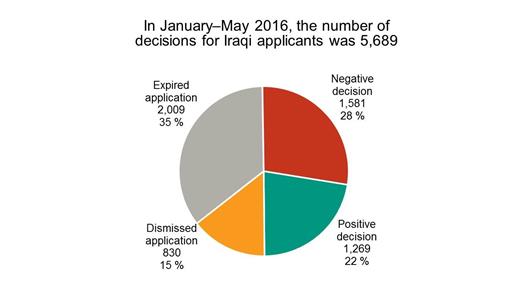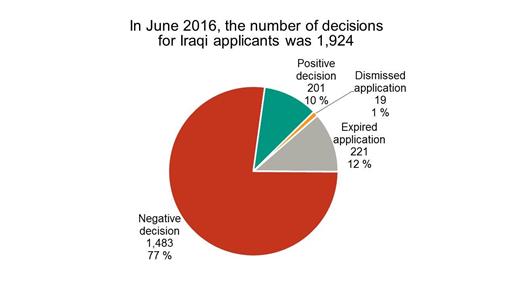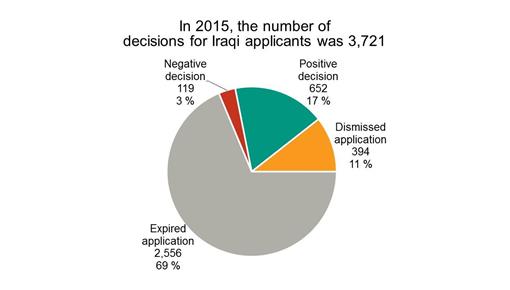Asylum decisions for Iraqis: The share of negative decisions has increased
The amendment to the Aliens Act in May which removed humanitarian protection from the Act and the Finnish Immigration Service’s new guidelines for making decisions concerning Iraq is starting to show in the distribution of asylum decision for Iraqis. The share of negative decisions has increased significantly.
From January to June 2016, asylum or some other residence permit was granted to 1,470 Iraqis, which constitutes 19 per cent of all decisions. During the same period, a negative decision was received by 3,064 Iraqis, which constitutes 40 per cent of all decisions. After implementing the amendments and making the changes to the country guidelines in May, the share of negative decisions stands out even more: in June, negative decisions comprised 77 per cent of all decisions for Iraqis.
The grounds for a negative decision are often that the applicant comes from an area where, at the moment, he or she can stay without being under serious and individual threat or the applicant has the possibility to receive internal protection in his or her home country.
The large share of negative decisions is also influenced by the applicant profiles and the way the work is organised at the Finnish Immigration Service: in order to eliminate the backlog many so called clearly negative cases and cases where there is no need for additional information were decided during early summer.


The Finnish Immigration Service closely follows the situation in Iraq
There has been a lot of discussion in social media about why the Finnish Immigration Service has declared Iraq a safe country. This is based on a misunderstanding. Finland has tightened the requirements for granting international protection in an amendment to the Aliens Act which came into effect 16 May, when the granting of humanitarian protection was removed from the Act. This automatically means that some applicants will not be granted protection but Iraq is not considered a safe country as defined in the Aliens Act.
The Finnish Immigration Service has also further defined the grounds for granting subsidiary protection in its country guidelines, which are updated every six months and take into account the security situation in a certain country or region. Subsidiary protection based only on the situation in the applicant’s place of residence is not granted to Iraqis in the current situation.
The guidelines are a common starting point for making sure the decisions are consistent. The Finnish Immigration Service monitors the situation in the areas controlled by Isis and, for example, in Bagdad and takes any changes that occur into account if need be.
– The recent bombings have been random and are possibly connected to the end of Ramadan and the weakened position of Isis. These events have not directly affected all people living in Bagdad, says Esko Repo, the Director of the Asylum Unit at the Finnish Immigration Service.
– Bagdad is a vast city with mostly calm areas. We find that returning to Bagdad is also possible. However, the grounds for each application and the possibility to return are always investigated individually.
Over 11,000 Iraqis have already received their decision
In 2015 and from January to June in 2016, a total of 11,334 Iraqis received their asylum decision. A positive decision has been made in 2,122 (19 per cent) cases and a negative decision in 3,183 (28 per cent) cases.
In 2015, many Iraqis returned voluntarily to their home country, for example because their family’s situation at home had changed or because they grew tired of waiting for their decision. This is evident in the form of a large number of expiry decisions (69 per cent of all decisions made in 2015). A decision on expiry is made when the person himself or herself waives the application for asylum or when it has not been possible to make contact with the person for two months.

Nearly 21,000 Iraqi applicants in eighteen months
In 2015, more than 32,000 asylum seekers came to Finland. Of these, about 20,000 came from Iraq. So far this year, approximately 700 Iraqis have arrived in Finland.
About 10,000 Iraqi applicants are still waiting for their decision, since the almost tenfold number of applicants last year slowed down the decision making process. During the winter, the Finnish Immigration Service hired 500 new employees to process asylum applications in order to speed up the process, and during the last few months, we have clearly processed more decisions than before.
Further information for the media
Esko Repo, Director of Asylum Unit
tel. +358 295 430 431, firstname.lastname@migri.fi
| FACTS: A well-founded fear of being persecuted is a requirement for granting asylum |
|---|
Each asylum application is investigated individually and each applicant must give his or her reasons for why he or she in particular would encounter persecution or serious harm. Asylum or subsidiary protection is granted to persons who would face a serious individual threat if they were returned to their home region. If a person can seek internal protection in his or her home country, he or she is not granted international protection. Asylum can be granted if
Subsidiary protection can be granted if
|
Correction on 12 August: In the beginning of the year, 1,470 Iraqis got a positive decision on asylum, not 1,424.


